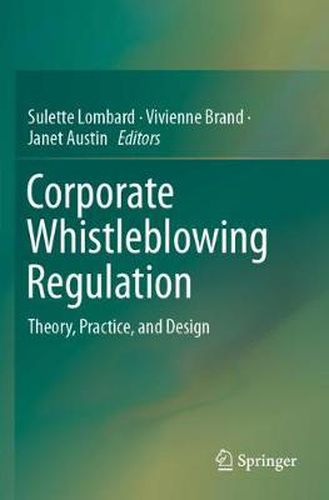Readings Newsletter
Become a Readings Member to make your shopping experience even easier.
Sign in or sign up for free!
You’re not far away from qualifying for FREE standard shipping within Australia
You’ve qualified for FREE standard shipping within Australia
The cart is loading…






This title is printed to order. This book may have been self-published. If so, we cannot guarantee the quality of the content. In the main most books will have gone through the editing process however some may not. We therefore suggest that you be aware of this before ordering this book. If in doubt check either the author or publisher’s details as we are unable to accept any returns unless they are faulty. Please contact us if you have any questions.
This book adopts a cross-jurisdictional perspective to consider contemporary corporate whistleblowing issues from an ethical theoretical perspective, regulatory perspective, and practical perspective. It includes in particular arguments in favour of and against the adoption of financial incentive schemes for whistleblowers, as well as the potential implications of adopting such schemes. This approach provides a valuable opportunity for comparison from a law reform perspective.
The book brings together authors from various jurisdictions - Canada, Australia, and the USA - who, through their exposure to this area of law, be it as practitioners, regulators, or academics, offer valuable and interesting insights on the emerging and topical area of corporate whistleblowing generally, and whistleblowing rewards in particular. These three jurisdictions were selected on the basis of their reform-oriented stance on corporate whistleblowing and/or implementation of financial incentives for whistleblowing, creating an opportunity to assess contemporary regulatory structures and in particular how incentives measures could interact with corporate whistleblowing regulatory frameworks, and how they could contribute to improved governance. The reasons for the rejection of the notion of financial incentives in the United Kingdom are also reviewed, in order to provide a comparative overview.
The book provides useful guidance for those who may be affected by the implementation of corporate whistleblowing schemes, including for reward, whether as regulators, practitioners, company directors, or whistle blowers.
$9.00 standard shipping within Australia
FREE standard shipping within Australia for orders over $100.00
Express & International shipping calculated at checkout
This title is printed to order. This book may have been self-published. If so, we cannot guarantee the quality of the content. In the main most books will have gone through the editing process however some may not. We therefore suggest that you be aware of this before ordering this book. If in doubt check either the author or publisher’s details as we are unable to accept any returns unless they are faulty. Please contact us if you have any questions.
This book adopts a cross-jurisdictional perspective to consider contemporary corporate whistleblowing issues from an ethical theoretical perspective, regulatory perspective, and practical perspective. It includes in particular arguments in favour of and against the adoption of financial incentive schemes for whistleblowers, as well as the potential implications of adopting such schemes. This approach provides a valuable opportunity for comparison from a law reform perspective.
The book brings together authors from various jurisdictions - Canada, Australia, and the USA - who, through their exposure to this area of law, be it as practitioners, regulators, or academics, offer valuable and interesting insights on the emerging and topical area of corporate whistleblowing generally, and whistleblowing rewards in particular. These three jurisdictions were selected on the basis of their reform-oriented stance on corporate whistleblowing and/or implementation of financial incentives for whistleblowing, creating an opportunity to assess contemporary regulatory structures and in particular how incentives measures could interact with corporate whistleblowing regulatory frameworks, and how they could contribute to improved governance. The reasons for the rejection of the notion of financial incentives in the United Kingdom are also reviewed, in order to provide a comparative overview.
The book provides useful guidance for those who may be affected by the implementation of corporate whistleblowing schemes, including for reward, whether as regulators, practitioners, company directors, or whistle blowers.